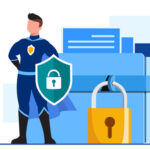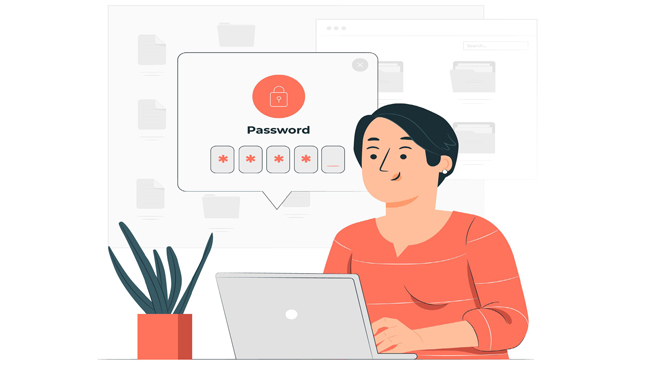If you use the Internet, then you probably have accounts on at least a dozen websites which means you have at least a dozen passwords. And if you think that all your accounts are fully secured through the passwords, then think again.
Let’s look at some facts:
- 84% of web users reuse passwords on multiple websites (Source: Bitwarden survey).
- 45% of web users didn’t change their passwords even when a breach took place (Source: LastPass study)
Clearly, so many people are unaware of the risks of cyberattacks and it’s possible, that even you don’t fully understand how data breaches affect you. If you want to protect your sensitive information such as bank account details, personal details, sensitive documents, etc. then you need to use strong passwords.
Why Strong Passwords?
There is no guarantee that having a strong password can protect you from threats such as malware, spyware, data breach, etc. However, a weak password almost guarantees that cybercriminals can break into your online profiles and accounts.
Believe it or not, the most popular password in the world last year was “password” and hackers cracked it in just one second! Other popular passwords such as 123456, guest, and qwerty are just as easy to break.
Even if you are using standard words and phrases as your passwords, your passwords can still be cracked easily. This is because many cybercriminals use dictionaries or brute-force attacks to crack passwords. In these attacks, they use a series of common words and phrases one by one to identify your password.
These are two of many reasons why weak passwords are ineffective in online security and you need to learn strong password practices.
How to Choose Strong Passwords and Apply Good Practices
There are several things you need to keep in mind when developing good password habits:
1. Use Strong Passwords
A strong password is generally at least 8-10 characters long, doesn’t use common names or phrases, and comprises the following:
- Uppercase and lowercase alphabets
- Special characters such as *,#, etc.
- Numeric characters
Some organizations and institutes also recommend using long passphrases for passwords. The benefit of creating such passphrases is that remembering them is easy but cracking them is hard.
2. Implement Two-Factor Authentication
An account password works as a security checkpoint for any user that tries to access the account. So, what if you can add another security checkpoint? Will that increase the security level twofold? The answer is, yes!
You can add another layer of security to your account by enabling two-factor authentication. You may have already seen this facility in your banking app or a social media app. Once you activate it, anyone who tries to access your account, including you, has to enter a unique numeric code (new code generated at every new instance) that’s sent to the registered mobile number. Since no one else but you have access to your phone, only you can enter this code and access your account.
3. Raise Cybersecurity Awareness
To ensure you don’t become a victim of a cyberattack and to boost your cybersecurity, you need to raise your awareness of different kinds of online risks. For instance, you need to be careful about phishing attacks in which cybercriminals send malicious emails disguised as genuine emails to their victims. These emails or messages contain malicious links or attachments which when clicked by the users, lead to data breaches, malware attacks, etc.
Other prevalent cybersecurity threats include social engineering, ransomware, etc. There are many reputed resources on online that you can refer to increase your knowledge and prepare yourself better against online threats.
4. Use a Password Manager
The challenge in creating strong passwords for multiple websites is that you can’t possibly memorize all of them. Each password is complex and different from the rest and when you need to access your accounts, it can be difficult to recall which account uses which password. An easy solution for this problem is a password manager.
A password manager is exactly what it sounds like- it’s a software utility that stores all your passwords in a single vault. You can lock this program with a single master password that can grant you access to all your passwords. So, all you need to do is remember this is just one password instead of many passwords.
There are many password managers you can find online, both free and paid. For instance, Bitdefender Password Manager is a reliable and robust password manager that not only helps you to store and organize many passwords, but also comes with strong cryptographic algorithms that increase the safety of saved passwords.
5. Use Alternative Authentication Systems
On some devices, you can use advanced authentication mechanisms to access your accounts. For instance, in the new iPhones, you can use face ID to access your phone or log into your banking apps, social media apps, etc. Some devices also have a built-in fingerprint scanner that you can use to secure your account. Whenever such options are available, it’s better to rely on these compared to just passwords. This is because these technologies are hardware-based and more reliable.
Conclusion
We live in an age where is an app for almost everything. With so many applications and websites and so many accounts to use, it can be difficult to keep track of your passwords. However, you can’t afford to use the same password for every account. Use a password manager or save your passwords through some other means, but never use a weak password. You never know when you get involved in a data breach. Stay safe and stay vigilant!




Leave a comment
Have something to say about this article? Add your comment and start the discussion.